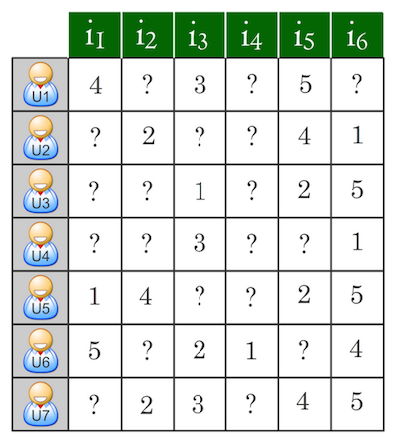Recommender systems are pretty self-explanatory; as the name suggests, they are systems or techniques that recommend or suggest a particular product, service, or entity. However, these systems can be classified into the following two categories, based on their approach to providing recommendations.
What is a recommender system?
The prediction problem
In this version of the problem, we are given a matrix of m users and n items. Each row of the matrix represents a user and each column represents an item. The value of the cell in the ith row and the jth column denotes the rating given by user i to item j. This value is usually denoted as rij.
For instance, consider the matrix in the following screenshot:

This matrix has seven users rating six items. Therefore, m = 7 and n = 6. User 1 has given the item 1 a rating of 4. Therefore, r11 = 4.
Let us now consider a more concrete example. Imagine you are Netflix and you have a repository of 20,000 movies and 5,000 users. You have a system in place that records every rating that each user gives to a particular movie. In other words, you have the rating matrix (of shape 5,000 × 20,000) with you.
However, all your users will have seen only a fraction of the movies you have available on your site; therefore, the matrix you have is sparse. In other words, most of the entries in your matrix are empty, as most users have not rated most of your movies.
The prediction problem, therefore, aims to predict these missing values using all the information it has at its disposal (the ratings recorded, data on movies, data on users, and so on). If it is able to predict the missing values accurately, it will be able to give great recommendations. For example, if user i has not used item j, but our system predicts a very high rating (denoted by  ij), it is highly likely that i will love j should they discover it through the system.
ij), it is highly likely that i will love j should they discover it through the system.
The ranking problem
Ranking is the more intuitive formulation of the recommendation problem. Given a set of n items, the ranking problem tries to discern the top k items to recommend to a particular user, utilizing all of the information at its disposal.

Imagine you are Airbnb, much like the preceding example. Your user has input the specific things they are looking for in their host and the space (such as their location, and budget). You want to display the top 10 results that satisfy those aforementioned conditions. This would be an example of the ranking problem.
It is easy to see that the prediction problem often boils down to the ranking problem. If we are able to predict missing values, we can extract the top values and display them as our results.
In this book, we will look at both formulations and build systems that effectively solve them.































































